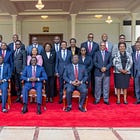Kenyans are changing how they get their news
Serious consequences for democracy are inevitable.
Norbert Mburu in Nairobi

Earlier this year, Kenya witnessed massive, Gen Z-led protests against new taxes proposed by the president. These protests manifested in the streets of Nairobi, but were organised and amplified online. Many Kenyans only learned about the protests through social media.
How exactly did that news spread? The answer is grim reading for legacy media houses – and may reshape the nature of political discourse in the country.
According to our research, so-called alternative media outlets accounted for as much as half of the most popular digital news consumption in Kenya, even at the height of the uprising. This is significant in a country where 89% of news consumption happens online.
These alternative media outlets tend to be focused on light, snappy content – usually with little regard for journalistic principles or ethics. The most popular among them is The Nairobi Gossip Club, a tabloid-style website that focuses on romantic scandals and celebrity news.
Crucially for the health of Kenyan democracy, these new media voices are unconstrained by traditional journalistic standards of ethics, fact-checking and avoiding conflict-of-interest. Yet, whether they like it or not, they are on the front line of upholding news credibility and fighting mis- and dis-information.
For legacy media houses, the success of such platforms – and the continuing failure of Kenya’s biggest newspapers to grow audience or revenue, while laying off dozens of journalists – must make them rethink their approach. Should they try and replicate The Nairobi Gossip Club’s approach? If not, how do you compete with their brand of news on crowded social media feeds?
The political implications are also clear. Politicians will co-opt these new media voices. We saw this in the recent United States elections, where candidates invested significant time and effort in new media platforms (like Donald Trump’s three-hour long appearance on The Joe Rogan Experience, a podcast) and spent less time engaging with traditional media.
Influencer and alternative media’s mastery of digital-native formats, coupled with high audience trust, will become invaluable for reaching younger, always-online voters – but who, exactly, will be holding the politicians to account?




